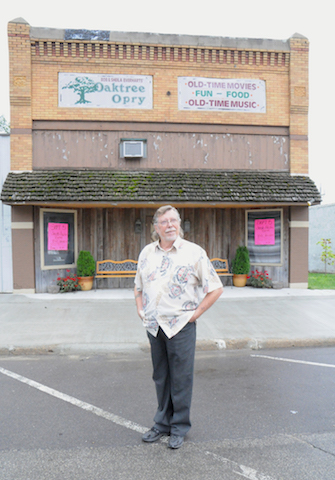
By Michael Swanger
Nothing grows when you rip the roots out of the ground.
Farmers know it.
Gardeners know it.
Robert Phillip “Bob” Everhart knew it, too. He devoted himself professionally and personally to illuminating that simple fact of life and he demonstrated it on stages around the world, including those in his small town stomping grounds of Anita and Le Mars for more than 60 years.
Bob’s mission in life was not to propagate plants or crops. It was to cultivate and to sustain an appreciation for acoustic roots music — old time country, bluegrass, gospel and folk.
When Bob died on Aug. 20, 2021, at the age of 85, those forms of organic music — as well as their practitioners, fans and small industries — lost one of their most hard working, multi-talented and knowledgable advocates. Though often overshadowed by more popular forms of music, those historical art forms are still relevant today thanks to folks like Bob.

Bob Everhart in front of the Oak Tree Opry in Anita in 2014. Photo by Michael Swanger
Bob was a multi-instrumentalist (guitar, 12-string guitar, harmonica), singer, songwriter, producer, recording and touring artist (including six albums for Folkways Records), concert promoter, record label owner (Prairie Music Records), music collector and owner of a music venue and music museum in Anita — the Oak Tree Opry and the Pioneer Music Museum, which houses America’s Old Time Music Hall of Fame and America’s Old Time Fiddler’s Hall of Fame.
Born in Nebraska on June 16, 1936, Bob and his family moved to Iowa where he graduated from high school in Council Bluffs. He was a self-taught musician, starting at age seven. After high school he served four years in the U.S. Navy before studying business administration and psychology at the University of Nebraska.
During the 1960s, he moved to Chicago, Ill., to play tenor saxophone and harmonica in rock ‘n’ roll bands, rubbing elbows with the likes of Sonny & Cher, Bob Dylan and the Rolling Stones. But he gave that up after being shot in the head at a motel, which landed him in a Windy City hospital for several weeks. After his release, he returned to Nebraska to pursue his love of roots music and to record commercials.
In 1972, he began working for three years as a radio announcer in Alaska. That led him back to the Midwest, where he continued to work in radio and perform his music.
In 1975, Bob founded the nonprofit National Traditional Country Music Association (NTCMA) to promote and preserve traditional styles of rural music. In 1976, the first NTCMA festival was held in Council Bluffs. It was the beginning of a decades-long run in which the National Old Time Country, Bluegrass and Folk Music Festival would annually host more than 600 professional and amateur performers in August and would make its longtime home in Le Mars.
For seven years, Bob also created, produced, hosted and performed on the PBS national TV show “Old Time Country Music” and the syndicated radio show “Old Time Music Hour.”
Bob and his wife, Sheila, worked tirelessly to operate a variety of businesses and to write, perform and record their own music. They were married in 1992 and have a daughter, Bobbie Lhea.
When I interviewed and observed Bob at work in Anita during the fall of 2014 for an Iowa History Journal feature story (Volume 6, Issue 6, “Preserving a musical heritage: Roots music thrives at Pioneer Music Museum and Oak Tree Opry”) it was plain to see that Bob nurtured the music that he loved. He did so with the skill, wisdom and humility of a thoughtful steward.
On the Friday night in which I visited the Oak Tree Opry, a nearly sold-out crowd listened to Iowa musicians and a headlining band from Texas perform original material and timeless songs by the Carter Family, Jimmie Rodgers, Hank Williams and Bill Monroe.
“It’s where really talented artists with sincerity in their music can perform for an appreciative crowd for a decent fee,” Bob said about the Oak Tree Opry. “We get a mix of people who come here to listen to music they love at an affordable price, to get away from the world for a while and to be with friends. Our audience is a mix of farmers and city people, wealthy and not wealthy. They’re young and old …”
Bob won numerous awards and accolades for his work, but nothing pleased him more than showcasing country, bluegrass and folk musicians.
“There are some really good musicians in Iowa,” he said. “They just need a place to play.”
Amen, Bob. Thanks for your stewardship.
TO READ MORE FASCINATING STORIES ABOUT IOWA HISTORY, subscribe to Iowa History Journal. You can also purchase back issues at the store.
